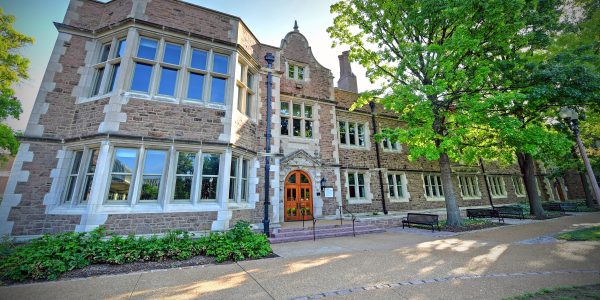The revamped office will help students across academic disciplines gain research experience and build relationships with faculty mentors.
When Kayla Harrington first came to WashU, she didn’t imagine herself as a researcher. Three years later, the junior psychology major is a Merle Kling fellow and a part-time researcher in the lab of Lori Markson, professor of psychological and brain sciences. She’s also in the literature review stage of her own research project on Black girlhood and adultification in the educational setting. Soon she’ll submit her first Institutional Review Board application.

(Photo: Courtesy of Lori Markson)
“I never thought I’d be doing research, but I honestly love it,” Harrington said. Participating in research opened her eyes to new career choices. As a first-year student, she’d thought the only option in her field was to become a clinical psychologist. Now she’s thinking about working in academia, education, or even the criminal justice system.
The value of experiences like Harrington’s has spurred a rethinking of the office and support for undergraduate research more broadly. Since work began on the Arts & Sciences Strategic Plan, Dean Feng Sheng Hu and Erin McGlothlin, vice dean of undergraduate affairs, have worked together to carefully review all aspects of current undergraduate operations, resulting in a number of changes including the reorganization of the Office of Undergraduate Research (OUR). At the end of last year, the office relaunched with two full-time staff members and its first faculty director, Markson.
“We’ve added expertise and we are focused on expanding and enhancing research opportunities for undergraduates across humanities, social sciences, and natural sciences,” McGlothlin said.
Markson has mentored undergraduate researchers in her labs for years. For her, it's essential that a diverse group of students, especially those coming from underrepresented backgrounds, can find their way into the world of research. “Some do it very naturally,” she said. “But many students don’t know what opportunities are available or how to locate them.”
It’s important for every student to have access to research opportunities, said Diana Silva José-Edwards, assistant director of the OUR. “The critical thinking, the hands-on experience, the relationship building that one can get through undergraduate research can have such a profound impact on a student’s personal, professional, and intellectual aspirations,” she said.
The biannual undergraduate research symposium, happening again this spring on April 25, is one way the OUR highlights undergraduate research. Rachael Silberstein, BA’21, started doing research as an undergraduate and presented a poster for the first time at the symposium in 2020 after recieving a SURA (Summer Undergraduate Research Award) through the OUR. Afterward, she continued her project and went on to present the same research at two other national conferences in the field. “The first time is nerve-wracking,” she said. “But being surrounded by incredible researchers and scholars willing to engage with you when you’re just starting a research career, it was awesome.”

(Photo: Courtesy of Rachael Silberstein)
The new OUR staff also wants to make sure research opportunities reach every academic discipline. While the natural and social sciences have traditionally offered a direct pipeline to research and mentoring through faculty-run labs and fieldwork, the humanities present a different model, McGlothlin said. “We are looking for new ways to mentor those students earlier in their trajectory at Washington University.”
The OUR won’t match students with mentors. Instead, staff have opted to coach them on how to develop those relationships on their own. “Our philosophy is to try and empower students to initiate and help them understand what it means to have a faculty mentor,” said Angela Fink, program manager of the OUR.
Fink emphasizes that they’ll be working on new ways to highlight fields that don’t lend themselves to the traditional professor-run lab model. “It’s helping students understand the points of entry and what the culture of each discipline looks like,” she said. “We are excited to think creatively about how we can create a new space for other fields to shine.”





